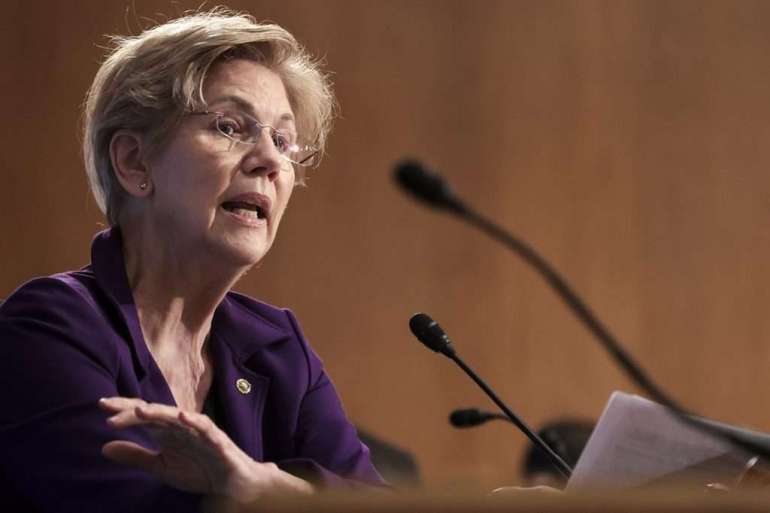Warren tries to ‘light the fire of urgency’ for Democrats

She wrote a New York Times op-ed last week claiming Democrats are “headed toward big losses in the midterms” without delivering on their goals, sat for a lengthy Crooked Media podcast interview to push the party to make deals on issues it ran on in 2020, then did a rare three-network sweep on the Sunday shows.
Democrats can’t afford to lose a single Senate seat and are at great risk of losing the House in November — but Warren is offering a prescription that’s in keeping with her policy-wonk identity during the 2020 primary. She wants anti-price gouging legislation and a ban on lawmaker stock trades on the Senate floor ASAP and quick work on a drug pricing and tax reform bill to wash away the bad taste of Build Back Better’s failure.
Summing up her role in the fractious Democratic Party at the moment, Warren said: “My job right now is to light the fire of urgency. We can’t waste a single day.”
In tandem with Congress, she also wants President Joe Biden to cancel student loan debt, raise overtime pay and use executive actions to bring down drug prices. With the evenly divided Senate struggling to pass even a $10 billion coronavirus bill, it’s a tall order; still, Warren is pitching her revitalized agenda as a vital antidote to conservative framing of the election.
Economically struggling Americans “creates an urgency that Democrats need to respond to. That’s why we’re here,” Warren said. “We’re not here to fight cultural wars. We’re here to make a real difference in the lives of people who need us.”
There’s some debate among Democrats about just how successful they’ve been during the last 16 months of complete control of Washington. They passed a $1.9 trillion coronavirus relief law, a $550 billion bipartisan infrastructure law, a government funding law, postal reform, confirmed a new Supreme Court justice and are on the verge of clinching a competition and manufacturing bill.
But rising prices, war in Ukraine and sagging public sentiment are dominating the political discourse.
“The inflation thing is really difficult because people will assume it’s Biden’s fault or our fault. When in fact the pandemic is causing more of this than anything else. And Ukraine is not helping,” said Sen. Jon Tester (D-Mont.), who wants the Senate to focus on lowering meat and prescription drug prices. “We’ve got to figure out things that we can do that we can tout.”
Some Democrats see a real risk of disappointing voters if they don’t take more action after running on a sweeping anti-corruption bill, federal elections reform, beefing up social spending programs and reversing the Trump tax cuts. Sen. Michael Bennet (D-Colo.) said that as a general rule, “I definitely think that over-promising and under-delivering is not an effective strategy.”
“What I would be doing is reversing the Trump tax cuts for the wealthiest Americans and extending the Child Tax Credit” that expired in January, said Bennet, who is up for reelection this fall. “That would help.”
There are nascent discussions occurring between Sen. Joe Manchin (D-W.Va.) and Senate Majority Leader Chuck Schumer on tax reform, climate and prescription drug bill to take the place of the sweeping “Build Back Better” social policy bill that Manchin opposed. That probably won’t have the expanded child tax credit in it, but Warren said nonetheless “it’s critical” Democrats use their power to pass a party-line spending plan successfully.
“I don’t care about the titles, labels, I don’t care about who gets to carry the leadership mantle or the authorship for doing the pieces. We need to pick the pieces that the American people are counting on us to deliver on,” she said.
But some Democrats are reluctant to crank up the negotiations, publicly at least. As Sen. Sherrod Brown (D-Ohio) put it: “We have an opportunity to do more. We don’t want the negotiations to be public … And I don’t want to raise expectations.” He argues that last year was the best year for a president during his three decades in Congress.
Sen. Bernie Sanders (I-Vt.) has advocated that Schumer put popular pieces of the defunct “Build Back Better” on the floor and dare Republicans and Manchin to block them, a strategy the Democratic leader has declined to embrace. And while Warren isn’t exactly pitching that, she said there could be some utility to creating contrasts between the two parties.
She wants Democrats to put a bill allowing the Federal Trade Commission to investigate price gouging responsible for costly consumer goods and “dare the Republicans to vote against it. A clean, simple bill.”
“Let’s put it to the Republicans. Do they care about price gouging from the perspective of helping the consumers? Or from the perspective of letting the big corporations continue to get away with it?” Warren said.
The tension between his multiple ambitious members’ visions sets up complicated dynamics for Schumer to navigate in the coming weeks. As Biden is asking for more money for military aid for Ukraine, there’s bipartisan hand-wringing over Biden’s border policies and Democrats are itching to confront rising prices.
There are also plenty of nominees Biden wants confirmed while Democrats still control the Senate, and a decreasing window of floor time. Tester described Schumer’s dilemma as: “What can he put on the floor to get the most bang for the buck and actually make a difference, that is more than just a press release?”
Warren sees an aggressive agenda as the best way to get Democrats out of their defensive crouch and scramble the assumption that they are headed for a shellacking this fall. “The urgency of the moment” demands it, she argues.
“The things we need to do are things that touch people’s lives directly,” Warren said. “We promised to act on this. The Republicans did not.”